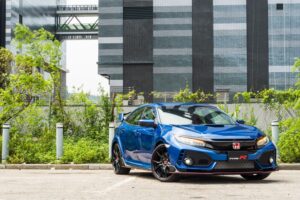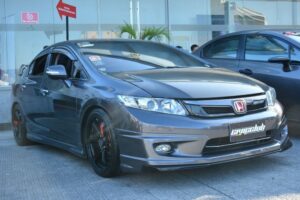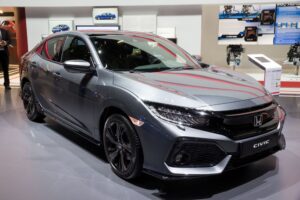Honda Civic is a sedan known for its sporty abilities, such as its 180 horsepower that is provided by a turbocharged engine.
The internal accessories and the latest technology used to build this car would make you want to spend extra dollars on it.
The classy yet sleek outlook and the Bose premium sound system make it hard to take your eyes off.
Despite adapting to the latest technologies and being the first movers, in any case, there are times when it tends to disappoint its users.
This leads to the users of this car wandering around to different mechanics and asking them, why won’t my Honda Civic start?
To save you time and energy, I have done enough research for you to be able to cater to this situation.
Listed down below are the causes of your Honda Civic not starting. Along with that, the solutions for those issues have been mentioned as well.
- Low Charge In Battery
- Alternator Failure
- Broken Starter Motor
- Blocked Fuel Line
- Damaged Spark Plugs
In some cases, two or three issues occur side by side. To know more about these issues, continue reading this article, as I will also talk about ways to prevent and curtail them.
Table of Contents
- 1 What Would Cause A Honda Civic To Not Start?
- 2 Frequently Asked Questions
- 2.1 Q1. Why Won’t My Honda Civic Start With New Battery?
- 2.2 Q2. Why Won’t My Honda Civic Start Even With A Jump?
- 2.3 Q3. Why Won’t My Honda Civic Start But Lights Work?
- 2.4 Q4. Why Won’t My Honda Civic Start But Cranks?
- 2.5 Q5. Why Won’t My Honda Civic Start Just Clicks?
- 2.6 Q6. Why Won’t My Honda Civic Start In The Cold Weather?
- 2.7 Q7. Why Won’t My Honda Civic Start After I Get Gas?
- 2.8 Q8. Why Won’t My Honda Civic Start But Radio Works?
- 3 Conclusion
What Would Cause A Honda Civic To Not Start?

Some people might find it difficult to believe that a car as aesthetically appealing and sporty as a Honda Civic would have some problems.
However, we know that every car experiences ups and downs in its journey if the car is not maintained well.
Your Honda Civic might not start due to the some problems I have discussed below.
I have conducted ample research on this topic to prevent that from happening and make the situation easy for you to tackle.
1: Low Charge In Battery
Knowing that Honda Civic is known for its internal and external components or accessories, one might think its battery would have a long life span.
However, research has been conducted on this, implying that the latest batteries have a shorter life span.
There are many causes of a low charge in the battery. The most common cause is the weather.
During extreme weather conditions, the battery has to produce and supply much more power, which tends to exhaust after a few hours.
Moreover, the chances of corrosion in the positive plates are also high. The indication of a low charge in the battery can be provided by your car in many ways.
In most cases, other important components stop functioning as they are directly associated with the car’s battery. You might also see multiple warning signs on the check engine light.
What Should You Do About It?
- Use a voltmeter to see how much voltage is being supplied to the engine by the battery of your Honda Civic.
- The voltmeter reading must not be lower than 12 volts because that would indicate that the battery is producing a low charge.
- You can also jump-start your car in this case but make sure you do not do it yourself because Honda Civic is a delicate car.
- Getting a new battery or a refurbished one is also an option.
2: Alternator Failure
We all know how valuable alternators are for every vehicle. The same is true for the Honda Civic as well. You must ensure that your alternators are in excellent shape.
If the alternators fail, the car’s brain, which is its engine, will fail as well. These two are inextricably linked. You can’t run anything if it is not supplied with the necessary energy.
Alternators in cars are essential because they supply electricity to our vehicles’ engines.
Your alternator can only become a problem after driving the car for more than 2500,000 miles. This is because alternators are specifically designed to last for a long time.
The process goes on by your alternator producing the charge and providing it to the battery.
The battery consumes the charge to send the power or energy to the car’s engine, which starts the car. An alternator failure can be very expensive to maintain.
What Should You Do About It?
- Firstly, if it has been more than five years, you need to change the battery and bring in a new battery. Once you have a new battery, you need to give it time before it starts working effectively.
- You can purchase a voltmeter and see if your batter is getting at least 12 volts of charge. If that is not the case and it shows a lower charge, you can invest in a new battery.
- Provide a jumpstart to your battery. You give it a strong electrical charge to provide it with enough voltage. It is like bringing a patient back from a coma.
3: Broken Starter Motor
The starter motor of a car is a very important component. This component is what a vehicle uses to start the car. The entire combustion system starts when the starter of a car is engaged.
Your car will not operate successfully if the starting motor is defective. This might leave you stuck and cost you a small fee to get your vehicle back on track.
If you twist the ignition key and nothing occurs, this must be the clearest sign that you have a starting motor problem.
The engine may create a clanging noise or remain entirely quiet.
When you turn the key, you may hear a grinding noise in the starter. This might be due to a faulty starting motor or a faulty circuit.
A broken starter motor is like broken buttons because if you have to start a particular system, you cannot do it without the important buttons.
You must consider the following solutions to fix the starter motor of your Honda Civic.
What Should You Do About It?
- Analyze whether there are any signs of corrosion near the components of your starter. If so, clean those parts in the most efficient way possible.
- Getting a new starter for any other car might not be expensive, but everything is expensive if you are buying it for Honda Civic. Consider buying a refurbished starter for your Civic.
- The flywheel attached to the starter needs to be well maintained as it can directly impact a starter’s performance.
4: Blocked Fuel Line
A fuel line is a faucet installed in a car’s engine. It regulates and manages the amount of liquid hydrogen or fuel vapor.
A fuel line, an essential component of the fuel injection system, is typically made up of all the pipes that emerge from the filter neck.
It is the link between the carbon canister and the fuel tank. The fuel line is entirely contained within the engine.
When there is a clog, fuel leaves the canister but does not reach the engine since the route to the engine—the fuel line—is congested.
If this occurs, the engine will typically not start until the problem is resolved.
If your Honda Civic, every once in a while, fails to start, screeches, or tends to start and then shuts down, you may have a blockage in the fuel system.
You must cater to this situation with utmost priority.
This is because if the leakage causes the fuel to reach the ignition system, it might lead to smoke coming out of the car and eventually setting the car on fire.
What Should You Do About It?
- Make sure to check for holes in the fuel transmission lines. It would be easier to see the leakages.
- Ensure the fuel filter is clean and no contaminants like dust or debris stop adequate fuel from being supplied.
- Replace the fuel filter every once in a while when the performance of your car’s engine seems to be compromised.
5: Damaged Spark Plugs
Spark plugs are critical engine components that generate electric sparks to activate the fuel-air combination in the combustion chambers and generate energy.
They are an important part of the ignition system because they aid the engine with functioning by continuously detonating the fuel-air mixture.
Spark plugs have a finite lifespan beyond which they become faulty. Sometimes, even before their lifespan ends, spark plugs might stop functioning.
Your spark plug damage might not sound like a serious issue, but the series of issues it brings must be avoided.
It would decrease the fuel economy of your Honda Civic to a great extent. This also impacts the battery of your car.
The battery would have to produce twice as much charge or energy to supply to your engine, which can eventually exhaust it.
If the whole combustion system were kept on hold because of small damaged spark plugs, then there would be no point in discussing other issues.
What Should You Do About It?
- If you have used your Honda Civic for more than 30,000 miles to 35,000 miles, you must consider getting new spark plugs for the car.
- In case you want to replace the spark plugs, it would cost you somewhere between $150 to $200.
- Please ensure that if the spark plugs are not of supreme quality, do not fall into the scam of purchasing them.
Frequently Asked Questions
Q1. Why Won’t My Honda Civic Start With New Battery?

Honda Civic is almost a sports car that requires products and components of supreme quality to function.
If you have tried to integrate a low-quality battery into the system of a Honda Civic, it will not work.
Moreover, you must ensure that you have bought the right battery for your car and tightened all the wires and screws.
Q2. Why Won’t My Honda Civic Start Even With A Jump?
Providing a jump start to a Honda Civic is not that common because often, users of this car only trust mechanics for this job.
However, if it does not start even with a jump, then you must get the car’s electrical system, alternator, and filters checked as the issue is not with the car’s battery.
Q3. Why Won’t My Honda Civic Start But Lights Work?
When the lights of a Honda Civic are working, it suggests that other systems run by electricity would be working as well.
In this case, you do not have to get the wires checked for corrosion. You, however, need to pay attention to the battery of the car, which might not be able to provide enough charge to the car.
Q4. Why Won’t My Honda Civic Start But Cranks?
The cranking of the Honda Civic often implies that the main issue is with the engine of this car.
The engine is either not getting enough charge from the battery, or the combustion system is not working efficiently.
This might be because of low fuel or air being provided for the process to start and for the engine to produce power.
Q5. Why Won’t My Honda Civic Start Just Clicks?
If you hear your Honda Civic clicking, you must call a mechanic and an electrician. This often suggests that the car’s important components, such as the alternator, have been damaged.
Honda Civic is not an inexpensive car to maintain. It needs to be catered at utmost priority, or it would create a thousand more issues for you.
Q6. Why Won’t My Honda Civic Start In The Cold Weather?
Cold weather often leads to rodents residing in the hoods of cars.
Honda Civics’ wires are made up of soy material which the rodents find quite tasty. Due to this, they chew on the wires and damage them.
Moreover, during the cold weather, moisture tends to get into the cars, which is not a good indication considering it leads to corrosion.
Q7. Why Won’t My Honda Civic Start After I Get Gas?
If you have gotten your tank full, but your car is still not starting, this suggests a leakage in the fuel line.
This leakage prevents enough gas from flowing towards the alternator, battery, and eventually the engine. You need to get a mechanic for this one.
Q8. Why Won’t My Honda Civic Start But Radio Works?
Lights and radio are a good indication as these suggest that the car’s electrical system is working efficiently.
However, this also tells us that the car’s ignition switch needs to be fixed on a priority basis.
Related: What Are The Worst Years For The Honda Civic?
Conclusion
Honda Civic is commendable because of its versatile outlook and sporty accessories/features.
If your car has ever troubled you like this and you are wondering, “Why won’t my Honda Civic start?” then you need not look further.
The issues that I have discussed and the solutions you can consider looking into are all tried and tested. These tend to help you a lot.
So, brace yourself for another sporty ride with Honda Civic, and do not let anyone tell you that the issue cannot be fixed if your car is not starting.
The features it has to offer to make it worth your purchase decision.

I am Tahir Azam, and I have been writing amazing articles for TaxiHack for as long as I can remember. I know everything that is to know when it comes to automobiles and is always on top of industry news and developments. While I am not an expert by any means, I pride myself on knowing the ins and outs of many different problems and, of course, their solutions. The articles on our website are some of the best and well-researched content that you will find, and I spend countless hours making sure this remains to be true. This is why I ask you to take your time out and read some of my articles, especially if you find a topic that resonates with you or is something you are looking into. This way, you will find the perfect mix of information and tips on your desired topic. Learn more about Tahir.




